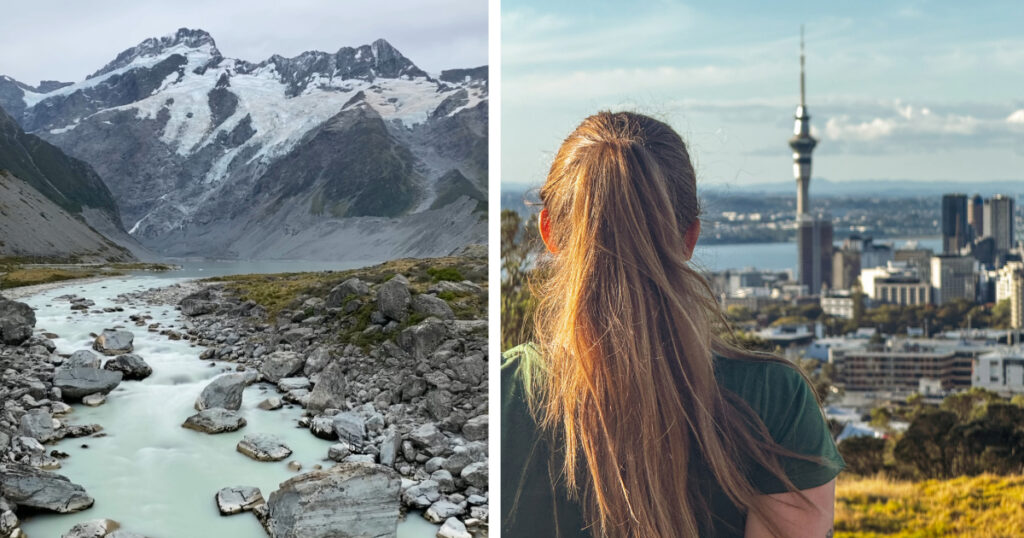I’m a born Canadian but have lived in Aotearoa New Zealand on-and-off for 8 years now. If you’re considering a long-term change, looking to study here, or just planning a one-year Working Holiday trip, you’ve likely wondered, is New Zealand a good place to live?
I only planned to stay for a year. But long story short, I fell in love (with New Zealand and a New Zealander) and extended my visa a billion times in various forms until I became a permanent resident. This is without a doubt one of the most beautiful countries in the world. But there are some things to know before you make the move.
This post may contain affiliate links. Booking through these links generates a small commission for me at no extra cost to you. Thanks for your support! All prices are in NZD.
Is New Zealand a good place to live?
So, is New Zealand a good place to live? Well, I certainly like it enough to justify the many hours of paperwork and thousands of dollars I’ve spent asking the government politely to let me stay. I love it here.
But nowhere is perfect! If you’re thinking of moving to New Zealand, it’s not all sunshine and rainbows. (Though, to be fair, we do get a lot of sunshine and rainbows.) Here are the most important things to consider before you decide to live in New Zealand.
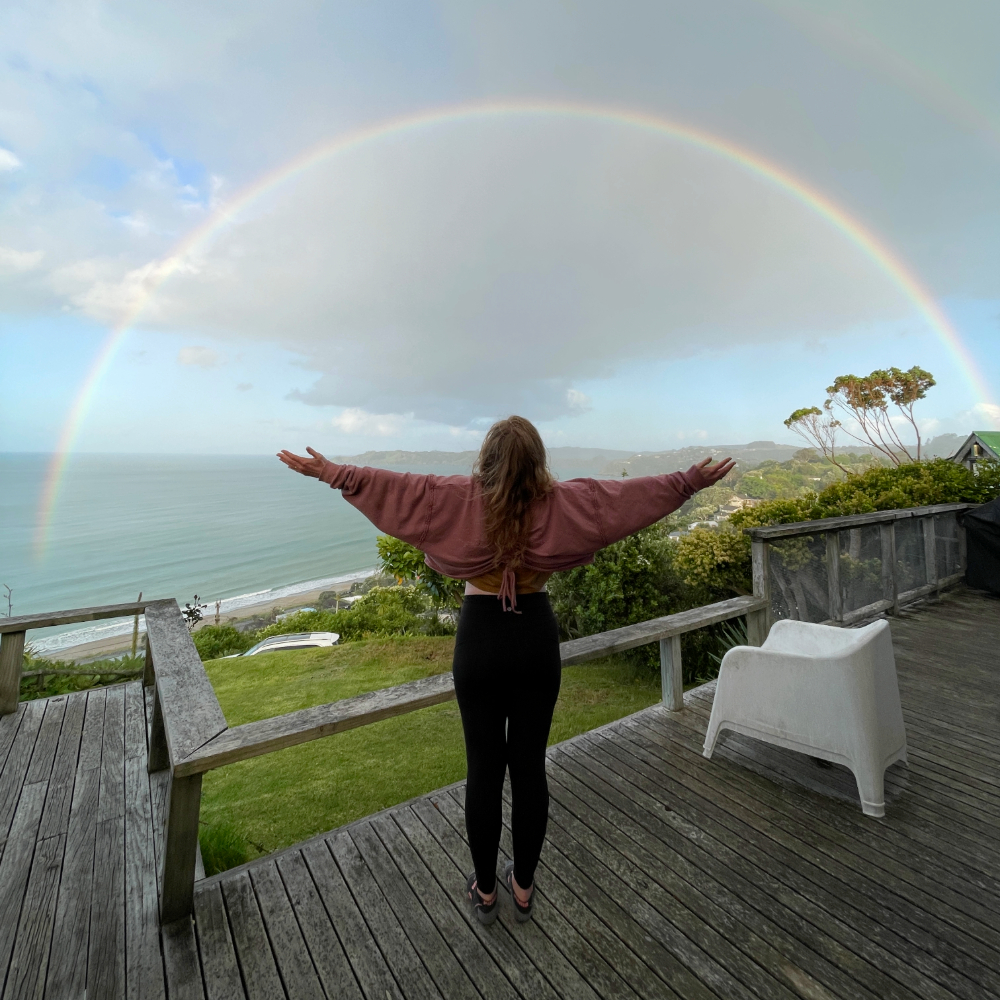
Waiheke Island, Auckland, New Zealand
Cost of living: Is New Zealand a good place to live?
Is New Zealand expensive? No matter how you slice it — yes. But there are also lots of free or affordable activities. If you’re into anything outdoorsy like hiking or surfing, you’ll never run out of things to do! All of Aotearoa’s national parks, beaches, forests, and most caves are completely free.
Your living expenses will vary significantly depending on the region. But if you want to live in Auckland, Wellington, or Queenstown, you can expect to pay more than if you settle in Dunedin, Nelson, or a small town.
Here are some of the main factors that influence the overall cost of living. You’ll want to consider these if you’re wondering, is New Zealand a good place to live? (All prices listed are in NZD.)
Housing: Is New Zealand a good place to live?
It’s exceedingly common for people to live with “flatmates” into their 30s… including yours truly. The average weekly rent is $560 NZD, according to Infometrics. (Last published in March, 2025) Yes, for some reason they do rent weekly here.
Obviously, what you pay will depends on a ton of things. But for reference, here are some New Zealand rent stats:
- Average weekly rent for a single room in a shared house:
- $300 in Queenstown
- $275 in Auckland (Central)
- $200 in Dunedin
- Average weekly rent for a single room in a shared house:
- Average weekly rent for a decent one-bedroom apartment:
- $600 in Queenstown
- $550 in Auckland
- $460 in Dunedin
- Average weekly rent for a decent one-bedroom apartment:
- Average weekly rent for a 3-bedroom family home:
- $1,000 in Queenstown
- $910 in Auckland
- $650 in Dunedin
- Average weekly rent for a 3-bedroom family home:
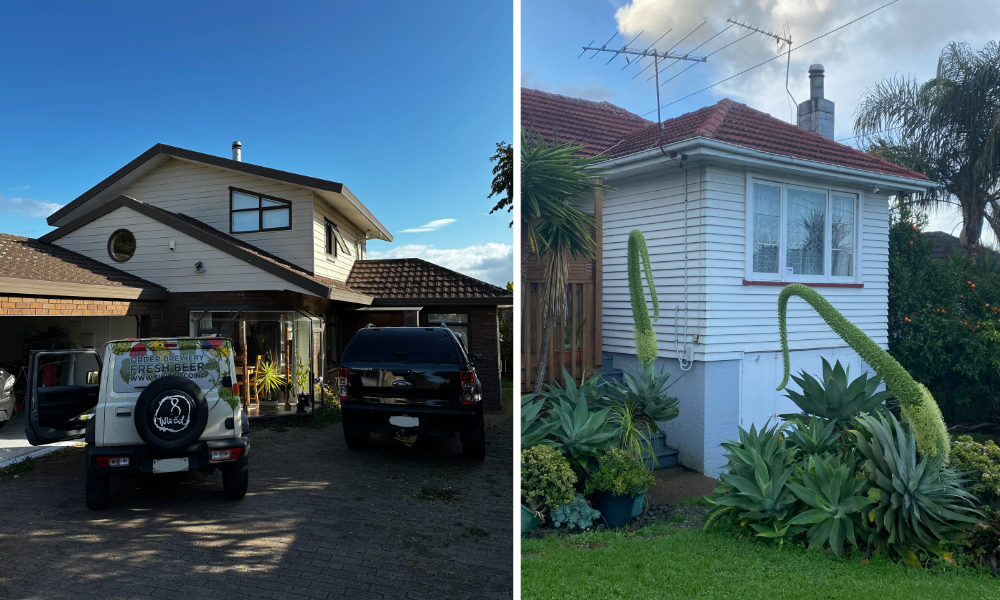
One of my old flats, and my favourite of Aotearoa’s many weird plants
Looking at buying property rather than renting? The average house price here is just over $900,000. So as with most places in the world, the housing market is in shambles. *Cries in millennial.* Here are the averages in some major cities:
- Auckland: $1.2 million
- Christchurch: $770,000
- Queenstown: $1.8 million
- Wellington: $1.1 million
- Whanganui: $500,000
Check TradeMe for the going rates in different regions — this is one of the main channels people use to find housing.
Transportation: Is New Zealand a good place to live?
Regardless of where you decide to live in New Zealand, you kinda need a car. I have some friends who live in the Auckland city centre who don’t have a car and just use Discover Cars or Mevo when they need a rental.
New Zealand is not well-connected by public transport, and all the best stuff to do is only accessible by car — or on foot! But even if you take public transport? Not that cheap.
So transportation will end up being a pretty significant cost when living in New Zealand. Unless you never plan to go anywhere, in which case, you prob shouldn’t move here.
Some important considerations about the cost of transportation in Aotearoa New Zealand:
- City transport. A short ride on the bus or train within Auckland starts at $2.80 for adults, and Wellington’s starts at $2. The price only goes up from there because they both use a zone system. (Yuck.)
- Inter-city transport. There are bus routes (and a few train routes) between some major cities. The prices fluctuate significantly. But for example, getting between Wanaka and Queenstown will cost you about $30, while a trip from Auckland to Rotorua costs around $50.
- Buying a car. You can buy a car that will physically move for like $3,000, or a decent Prius for $10,000.
- Gas/petrol prices. Price per litre is up over $2.60, and I’ve seen it reach $3.
- Car rental. I’ve seen car rentals on Discover Cars for like $40/day, but in the high season, they can be upwards of $100. This will obviously depend on how far in advance you book and the demand at the time etc. Algorithm stuff.
- Domestic flights. Air New Zealand and Jetstar are the two airlines here, with Air NZ being way better but often more expensive. A good one-way price from Auckland to Wellington is about $50 and Auckland to Queenstown about $100 (without checked luggage).
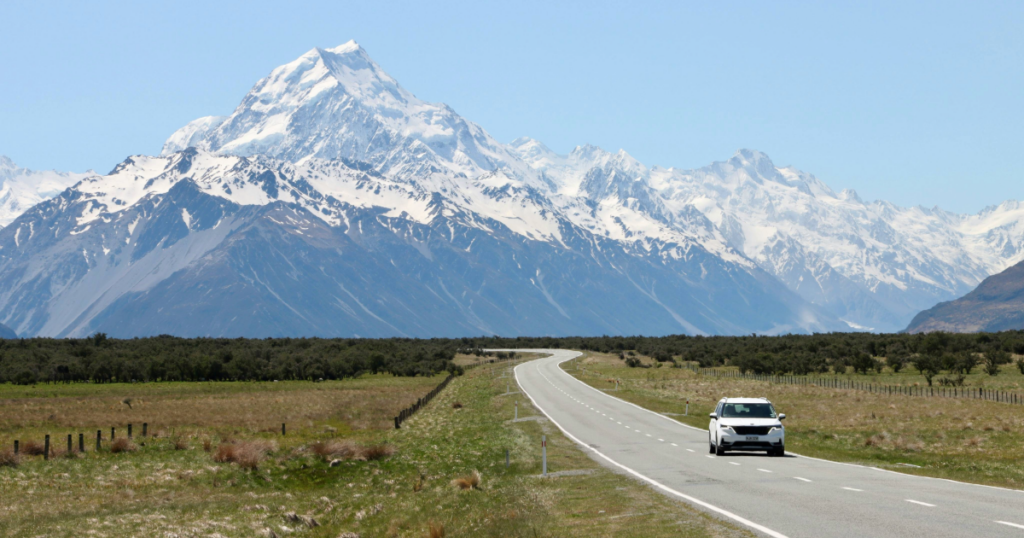
Dining out in Aotearoa: Is New Zealand a good place to live?
You’ll be hard pressed to find a meal under $15. Even fast food is about $13, if you’re a fan of the Big Mac Index as a reference point. I’m excited when I can find a bowl of no-frills noodles for under $20. A dish at a nicer sit-down restaurant is in the $25-40 range, whether it’s brunch or dinner.
Even drinks are expensive unless you stick to water. A soft drink is about $5 out, while a glass of beer or wine will run $12 — more if you like craft beer. Cocktails are consistently $20-25.
The cheapest thing you can eat in New Zealand? Do the Kiwi thing and grab a pie from a gas station for about $7. Might sound gross, but it’s literally elite. Takeaway fish & chips (pronounced fush and chups) to eat on the beach with your bare hands is another affordable Kiwi classic.
An amazing dining experience in Aotearoa
This isn’t a fair measure of the cost of dining out, but I want you to know about it:
Amisfield, outside of Queenstown, was just named the third-best restaurant in the world. And I’ve been so I can promise you the title is entirely deserved. The head chef worked at NOMA, and I’d argue some of the dishes are even more beautiful and inventive at Amisfield.
Whether you’re visiting or moving here full time, this restaurant needs to be on your foodie bucket list. But full disclosure: it is a whopping $700 per person (without the wine pairing).

Groceries: Is New Zealand a good place to live?
We spend about $150/week on groceries as a couple. Some items are insanely expensive, especially in the off-season. My go-to example is just a silly little cucumber — they cost about $6 in the winter compared to $1 in the summer. A bag of limes out-of-season can be $30/kg. It’s lawless out here.
You can find reasonably priced meat from chicken to lamb and even fish — though don’t even think about trying to buy raw salmon lol. Since everyone is talking about eggs, a dozen costs about $10. Because so many things are imported and we’re so far away — and because grocery chain moguls are greedy — groceries are a major topic of conversation around the high cost of living in New Zealand.
Job opportunities & how to move to New Zealand
Is New Zealand a good place to live? Yes. But the job market is tough here at the moment. Which, to be fair, is also the case in many countries around the world. The current unemployment rate is 5%, according to Stats NZ. As a result, a ton of Kiwis are moving to Australia for higher salaries and better job opportunities. However, that doesn’t mean there’s nothing for you here.
New Zealand citizens are leaving the country in record numbers. Between July 2024-2025, 73,400 New Zealanders left, compared with 25,800 returning home to live, according to Stats NZ.
In January, the government relaxed its visitor visa rules to attract so-called “digital nomads”– people who work remotely while travelling – to work in New Zealand. — The Guardian, September 2025
If you’re qualified for one of the 200-ish jobs on the “green list,” it’ll be really easy for you to get a resident work visa. Some jobs on the list as of 2025 include:
- Aeronautical/Aircraft Engineer
- Construction Manager
- Dairy Farm Manager
- Dental Specialist
- Electrician
- Medical Field (Like, just so many jobs in the medical field.)
- Plumber
- Software Tester
- Teacher
You can also get a Working Holiday Visa for one or two years (depending on your citizenship) if you’re under 35. Tourism is on the rise and still recovering from COVID, but there are lots of opportunities in hospitality, tour guiding, fruit picking, and other common temporary work. The minimum wage is $23.50.
Is New Zealand a good place to live? Quality of life
The quality of life in New Zealand is great. And the country’s commitment to protecting the environment is a major contributor to this. It’s so easy to head out of the city for a scenic walk on a nature trail or to relax on the beach. Go on your little mental health walks!
Climate change and natural disasters are of real concern. The country is peppered with volcanoes, prone to earthquakes, flooding, and cyclones, and I’m pretty sure there’s no ozone layer here.
New Zealand is incredibly safe. It’s not like crime doesn’t exist, but I’d leave my laptop alone at the cafe for a couple minutes, ya know? There’s also a distinct absence of dangerous wildlife — no deadly spiders, no large predators like bears, no crocodiles, no snakes at all. There’s the occasional shark, but the general wildlife situation is nothing like our Aussie neighbours’.
Aotearoa is all about the birds!

New Zealand ranks 12th on the World Happiness Report, behind all of Scandinavia, a few other countries, and — by just 0.022 of a point — Australia.
Aotearoa ranks 27th in the world for education. (For comparison: South Korea 1st, UK 12th, Australia 17th, Canada 19th, US 31st). So not the best ever, but overall still a good place to raise smart kids or get your degree.
Politically, from a global standpoint, New Zealand leans left. We have a conservative government at the moment but even now it’s left of Canada and the US. I couldn’t be less of an authority on this subject as a white immigrant, but Māori culture is celebrated here in a way that other Indigenous cultures are often not. Māori art, history, and language are woven into the Kiwi fabric. While there are efforts to uplift Māori identity, there’s still a long way to go.
Is New Zealand a good place to live? Aotearoa is at the edge of the Earth
Don’t worry, I’m not a Flat Earther. But whether you’re looking at a traditional Mercator Projection map, or this wonky version that depicts New Zealand as the centre of the world … it’s really far from basically everything.
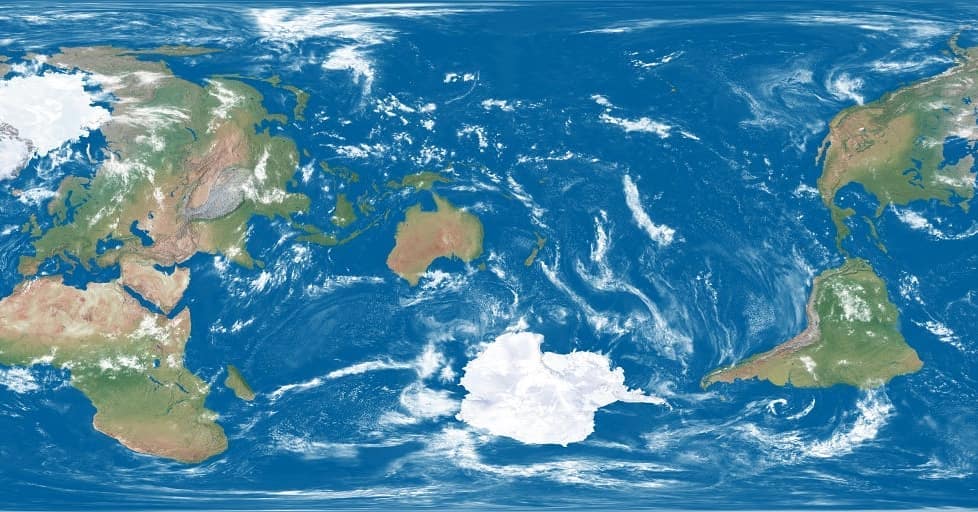
But living at the edge of the Earth isn't all bad.
COVID was a good example. Look how easy it was for New Zealand to shut down its borders and basically go on with life as usual for months while the rest of the world was locked inside! (However, the country was hit pretty hard by the pandemic in 2022.) The distance has also kept it relatively removed from all the madness going on in the US at the moment.
But on the day-to-day, living so far away has some significant downsides. Going on vacation? A trip to one of the Pacific Islands or Australia will be at least 3 hours. If you want to pop over to Bali or Tokyo, you can plan to spend about 10 hours on the plane. Europe? A mere 30 hours with layover(s).
And as you can imagine, those longer journeys come with higher price tags. (Think $500 for a return trip from Auckland to Melbourne.)
As someone who likes to travel, this is one of the biggest downsides to living in New Zealand.
Living in New Zealand vs. Canada
There’s an endless amount of things for me to compare, but here are a few stand out considerations.
Nature: New Zealand and Canada have a lot of similarities when it comes to the landscape. The main difference? Aotearoa is more compact. So you can drive from the beach to the mountains to a cave to a waterfall all in the same day. That said, New Zealand is about the size of the UK, so it’s not quite as small as you think it is.
Healthcare: Healthcare is weird here by my Canadian standards. New Zealand thinks it has free healthcare, but it only kinda does. It’s subsidized. Like, you’ll pay $50-75 per visit to your GP. In Canada I’ve never paid a dime for a visit to my doctor, a specialist, the hospital — nothin’. But Canada ranks #1 on the WHO’s list of best countries for free universal healthcare. By comparison, New Zealand doesn’t even rank in the top 10.
Cost of living: Comparing life in Toronto to Auckland, things are about on par. With the exchange rate, the $550/week rent for a one-bedroom apartment in Auckland is about equivalent to the $1,700 CAD average monthly rent for the same space in Toronto. Groceries are expensive in both locations, though you can find more cheap eats in Toronto. Gas is a bit cheaper in Canada and public transport is more accessible.
Is New Zealand a good place to live? More FAQs answered
Here are some questions you might have if you’ve wondered, “Is New Zealand a good place to live?”
What is the official language of New Zealand?
New Zealand has three official languages: Te Reo Māori, English, and New Zealand Sign Language. Only around 8% of Aotearoa’s population can speak Te Reo Māori at least fairly well. But several initiatives are in place to encourage more people to improve their proficiency and to integrate Te Reo into everyday life. That said, you won’t need to learn Te Reo to communicate while you’re here — around 90% of people speak English.
What is the capital in New Zealand?
Wellington is the capital of New Zealand. It may be unexpected since it’s less connected and much smaller than Auckland, but it’s a logical choice because it connects the North and South Islands. But Wellington is a super cool city to live in, surrounded by mountains and the sea with great food, craft beer, arts, and Te Papa — the best free museum in the world.
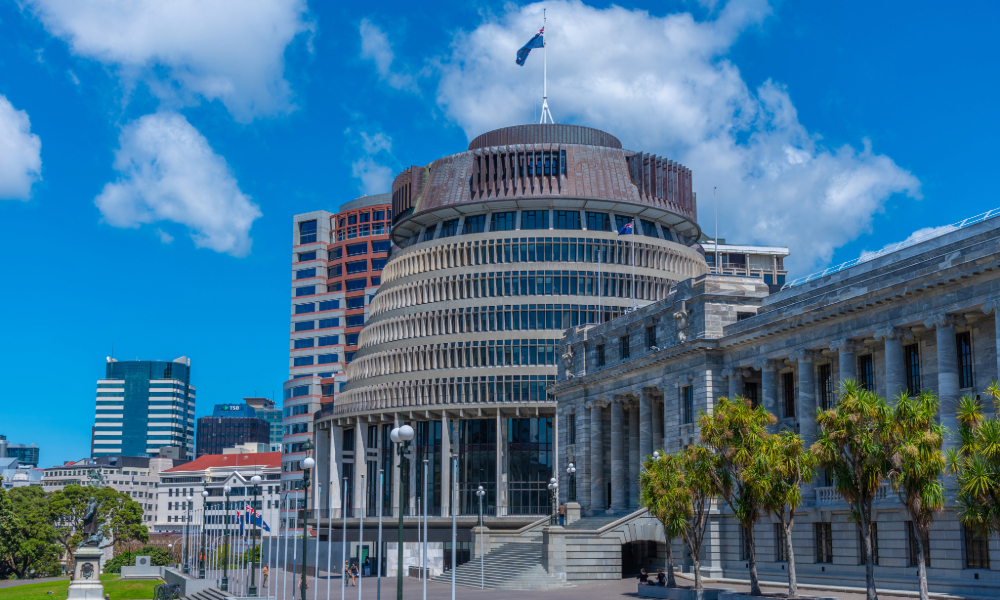
How big is New Zealand?
I see so many people planning two-week New Zealand itineraries being like, “I’m going to travel both islands in two weeks.” No, babe, you’re not. Would you drive all of the UK in two weeks? Aotearoa is small, but it’s bigger than you think.
Let’s compare! New Zealand is 270,000 km² (rounded for ease of reading).
- The United Kingdom is a bit smaller: 240,000 km²
- Vietnam is bigger: 330,000 km²
- The state of Colorado (US) is the same size: 270,000 km²
How far is New Zealand from Australia?
The shortest flights from to New Zealand to Australia take 3 or 4 hours depending on which direction you’re going. For example:
- Auckland — Sydney: 3 or 4 hours
- Wellington — Brisbane: 4 or 4.5 hours
- Queenstown — Melbourne: 3 or 3.5 hours
The shortest distance between the two countries is about 1,500 kms from Fiordland to Tasmania, but that’s not a flight route. That’s about the same distance as London to Rome, for the record! Flights between Aotearoa and Australia usually cost $200+ one way.
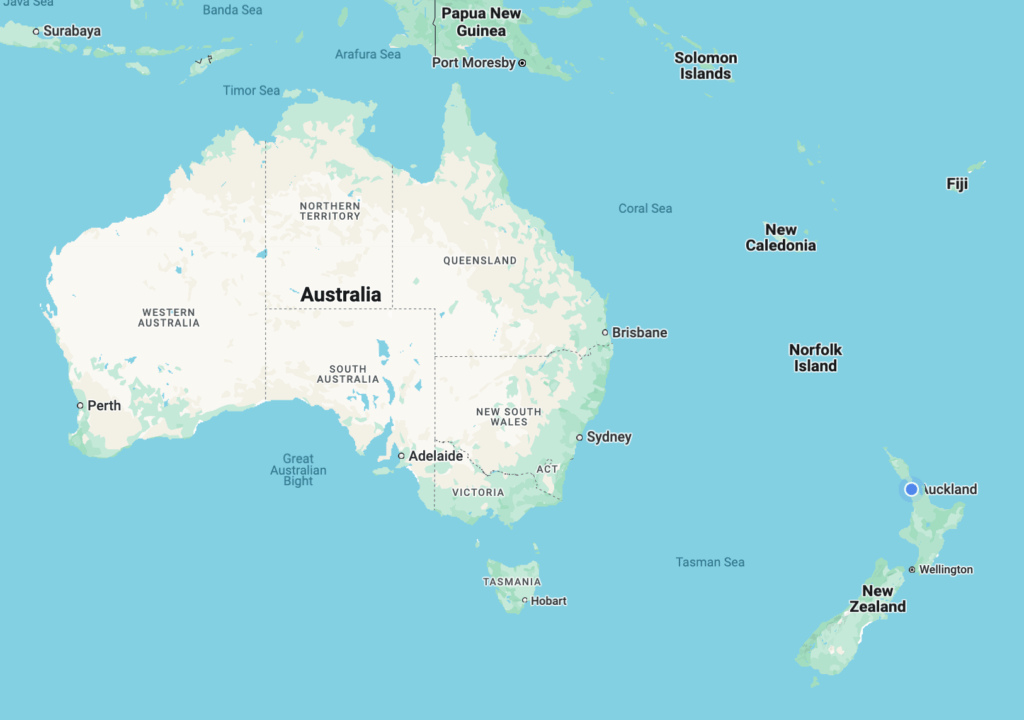
How can I move to New Zealand?
There are visas for Working Holiday travelers, students, partnerships, skilled workers, and more. Visit the Immigration New Zealand website to see what your options are.
What currency does Aotearoa use?
Aotearoa uses the New Zealand dollar (NZD). Cash is obviously fine, but some locations are now cashless and most transactions are contactless. The exchange rate is usually along the lines of:
- $10 NZD = 6 USD
- $10 NZD = 8 CAD
- $10 NZD = 5 EUR
- $10 NZD = 100 ZAR
- $10 NZD = 9.50 AUD
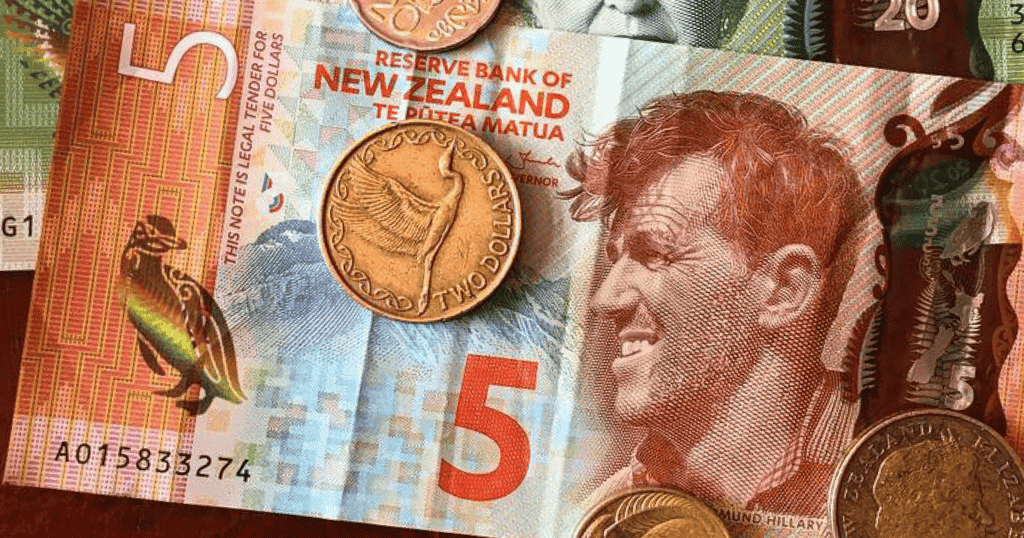
Are there snakes in New Zealand?
No! None! Only at the zoo! It’s a great place to live if those slithery little guys creep you out. I can’t express how liberating it is to just go camping or for a hike without having to worry about snakes. Or dangerous spiders. Or anything. It’s the best.
Is it better to live in Australia or New Zealand?
I lived in Melbourne in 2012/2013, so I’m not a total expert for this comparison but can still weigh in. I much prefer New Zealand. Call me crazy, but I like not worrying about wildlife killing me. Culturally, I feel it’s more in-line with my vibe.
As a sweeping generalized statement: Canadians are like Kiwis and Americans are like Aussies. There are things about Australia that are definitely better, like the shopping, nightlife in the cities, international access, etc. So it’s hard to say which is “better.” (But if you ask me, it’s Aotearoa.)

